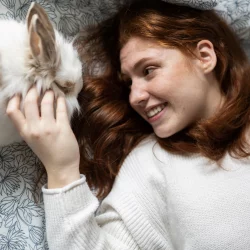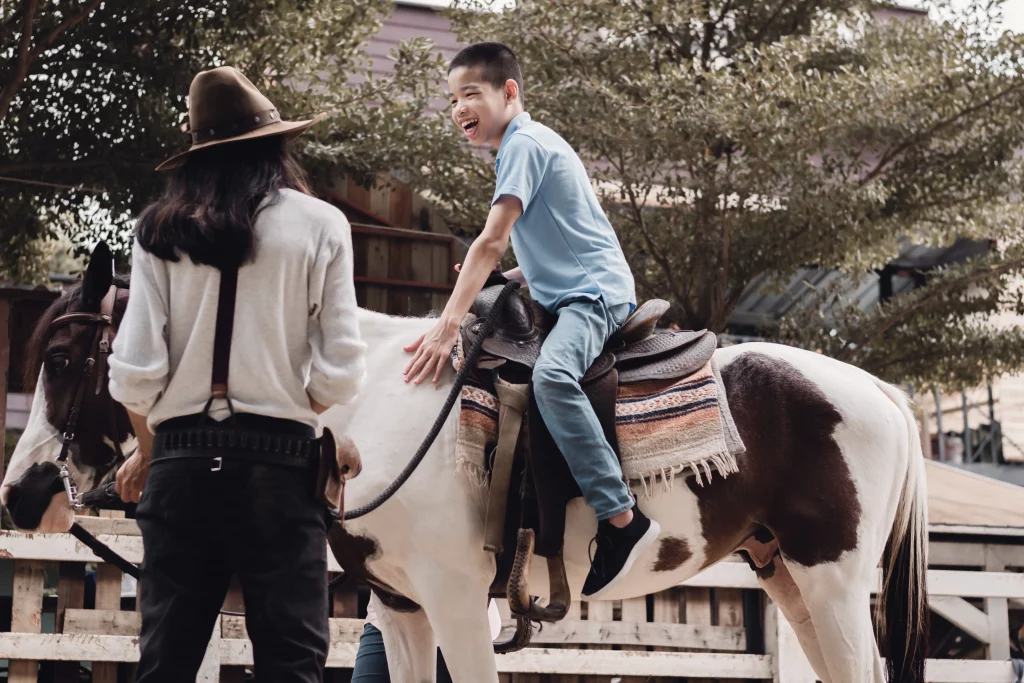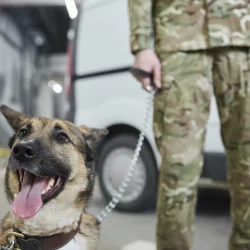

Animals are the best. They’re cute, fascinating, and hilarious. Pets can be an endless source of entertainment and love. There’s nothing quite like having your dog run up to greet you like you’re the most important person in the world, or the feeling of a warm, soft, purring cat sleeping in your lap.
Our pets fill us up with love and bring so much joy to our everyday lives.
Pets are also incredibly beneficial to our health. They don’t just supply us with bursts of happiness on a day-to-day basis, they improve our overall mental and physical health in the long term.
If you are on the fence about committing to a dog, cat, or any other animal (because it is a big responsibility, and should be taken seriously), here are some things to consider.
People with pets have significantly lower resting heart rates and blood pressure, and also recover faster after short periods of (heart) stress than people without pets.
When faced with stress, your body goes into fight-or-flight mode. Chemicals like cortisol and epinephrine pump through your body, causing your heart to beat faster and your blood to flow freer. This was great for our ancestors, living in the woods and occasionally being chased by a bear.
But in these modern-day times of unrelenting stress; constant information flow, frantically busy days, worries about the pandemic, politics, finances – all that cortisol is taking a toll on us, increasing our risk of heart disease and other physical ailments.
Contact with animals lowers our heart rates, lowers our physiological responses to stress (like fear and anxiety), and increases feelings of calmness.
Just ten minutes of petting a dog or cat can drastically lower your cortisol levels.
87% of physicians report that patients living with depression found vastly improved moods and outlooks as a result of pet ownership. People with pets laugh more than people without pets. Pet ownership can be a great distraction from symptoms associated with depression.
Pets, dogs in particular, keep us engaged in daily life. They need to be fed and walked, and they can be relentless in their demands for attention.
This type of joyful distraction from feelings of loneliness and isolation can feel like a miracle for those living with chronic or clinical depression.
85% of respondents in one survey (both pet owners and non-pet owners) believe that pet ownership reduces feelings of loneliness, particularly in older adults. A feeling of purpose and meaning greatly benefits elderly pet owners. Pets can increase morale and reduce feelings of isolation for women living alone.
Loneliness is a bigger problem than you might think. Out of 20,000 adult Americans:
Those are some rather staggering numbers, especially given that loneliness is linked to many other mental and physical health issues, including addiction, chronic illness, obesity, anxiety, and depression (7).
We are in the midst of what professionals call a “loneliness epidemic”, and according to the U.S. Census, more than 25% of adults are currently living alone.
Dogs need to be walked. Not only does this encourage you to get daily fresh air and exercise, it also significantly increases your chances of meeting and making connections with other people.
People with long-term mental health challenges report finding a renewed sense of control due to caring for a pet. Pets provide a sense of security and routine, as well as distraction and disruption from distressing symptoms, such as hearing voices or obsessive rumination (1).
The unconditional love of animals releases another chemical, oxytocin, which for those living with Post-Traumatic Stress Disorder (PTSD) can help to reduce flashbacks, emotional numbness, and angry outbursts.
Animals as therapy is not a new thing. Florence Nightingale acknowledged the benefits of animals for her patients, and Freud reported that having his dog in the room consistently helped his patients to relax (4).

Pet Therapy is just a broad term for any sort of therapeutic activity that takes advantage of the immense healing power of animals. There is a unique dynamic between animals and humans, one that consists of unconditional love and trust.
The human-animal bond is “a mutually beneficial and dynamic relationship between people and animals that is influenced by behaviors that are essential to the health and well-being of both” (8).
Animals are so incredibly different from us and yet amazingly similar. We all need to be loved. We have come to view animals as companions. We become incredibly attached to them, fulfilling an innate desire to bond.
For people struggling with anxiety, depression, trauma, substance abuse, or any other type of mental or emotional struggle, animals can provide a uniquely safe place to become vulnerable and allow us to drop our defenses and release our fears to heal.
People who have abused substances for a long period of time have become accustomed to the artificial stimulation of pleasure-releasing neurotransmitters and receptors that drugs and alcohol provide. Cessation of that substance can leave the user feeling depressed, angry, scared, and lonely.
Animals provide a safe alternative to stimulating those same neurotransmitters and receptors without the risk of further addiction and demise. They also aid in the recovery process by helping the recovering addict to create healthy bonds, and to step outside of their own mental chaos, and take care of something other than themselves.
The benefits of pet therapy for recovering addicts include:



We have a long way to go towards our understanding of Autistic Spectrum Disorder (ASD), and what it means for this population and their families.
We know for sure that people with AUD tend to have difficulty socializing with others and forming meaningful connections, which can lead to loneliness and isolation – and we do know how damaging loneliness can be.
Animals can provide companionship for people with AUD in a way that other people cannot. Animals aren’t put off by you if you don’t make eye contact or ask them how their day was.
Animal-assisted therapy (AAT) has been shown to increase socialization in children with AUD. Animals act as a “bridge” between the child and the non-autistic adult.
Extremely withdrawn children with AUD show significant improvement in both verbal and non-verbal communication with both the animal and the therapist when in the presence of a therapy dog.
Children with higher functioning AUD show lessening signs of isolation and depression while working with therapy dogs, as well as increased levels of socialization.
Keep in mind; it doesn’t have to be a therapy dog – just the presence of a pet in the household can benefit the entire family:

Post-traumatic stress disorder (PTSD) is characterized by panic attacks, severe mood swings, and difficulty in social situations. Severe or prolonged trauma resulting in PTSD can leave the person unable to live their lives in the same way they used to before the trauma occurred.
Service dogs specifically trained to assist those with mental disorders, including PTSD, can help their owners by:



Pets can be mentally and physically beneficial to aging seniors. And what’s really great about pets and seniors is, that you can usually find the perfect pet for the perfect owner.
If your aging loved one is still mobile but unmotivated and depressed, a dog that needs to be walked daily would be prudent. If they’re less mobile, maybe an older dog that can just slip out the back door to tend to his needs would be better.
If they’re not mobile, a cat who likes to sleep all day would be perfect. No matter what the animal/person match is, the animal can still provide all the important benefits:
Animals provide joy, and, simply put, joy helps you live a more fulfilling and satisfying life. This is important for seniors who may feel as if their best times have passed, especially if their loved ones live far away, or don’t come to visit as much as they should.

Dogs and cats aren’t the only animals out there! Different people have different needs when looking for the perfect animal companion
If you’ve been thinking about a pet for yourself, your family, or a loved one but feel worried about the added expense or responsibility, good. It should be a decision with some thought behind it. Our pets deserve the best treatment possible.
But remember, the amount of love and joy they provide you will pay you back tenfold for any sacrifices you must make. Unconditional love is the best kind of love there is.
1. George, O. (2022, April 11). Pet therapy and substance abuse: Does it work for addiction? Addiction Resource. Retrieved April 29, 2022, from https://addictionresource.com/guides/pet-therapy/
2. Guided by love. Pets for the Elderly. (n.d.). Retrieved April 29, 2022, from https://www.petsfortheelderly.org/our-work/research.php
3. Habri. (2020, April 13). The human-animal bond for autism spectrum disorder. HABRI. Retrieved April 29, 2022, from https://habri.org/blog/the-human-animal-bond-for-autism-spectrum-disorder/
4. Habri. (2020, November 23). Shareable infographic: Top 5 mental health benefits of pets. HABRI. Retrieved April 29, 2022, from https://habri.org/blog/mental-health-month-shareable-infographic-on-the-mental-health-benefits-of-pets/
5. How dogs can benefit children with autism. FitBark. (2021, April 11). Retrieved April 29, 2022, from https://www.fitbark.com/blog/how-dogs-can-benefit-children-with-autism/
6. Lee, B. Y. (2019, June 3). Are you feeling lonely? how about getting a pet? Forbes. Retrieved April 29, 2022, from https://www.forbes.com/sites/brucelee/2019/06/02/are-you-feeling-lonely-how-about-getting-a-pet/?sh=3cb6acbd4408
7. Melvin, C. (2022, March 23). History and science of the human-animal bond. Today’s Veterinary Nurse. Retrieved April 29, 2022, from https://todaysveterinarynurse.com/personal-professional-development/history-and-science-of-the-human-animal-bond/
8. O’Haire, M. E., Guérin, N. A., & Kirkham, A. C. (2015, August 7). Animal-assisted intervention for trauma: A systematic literature review. Frontiers in psychology. Retrieved April 29, 2022, from https://www.ncbi.nlm.nih.gov/pmc/articles/PMC4528099/
9. Stevens, S. (n.d.). Pets are good for your health, and we have the studies to prove it. Treehugger. Retrieved April 29, 2022, from https://www.treehugger.com/studies-that-prove-pets-are-good-your-health-4864141